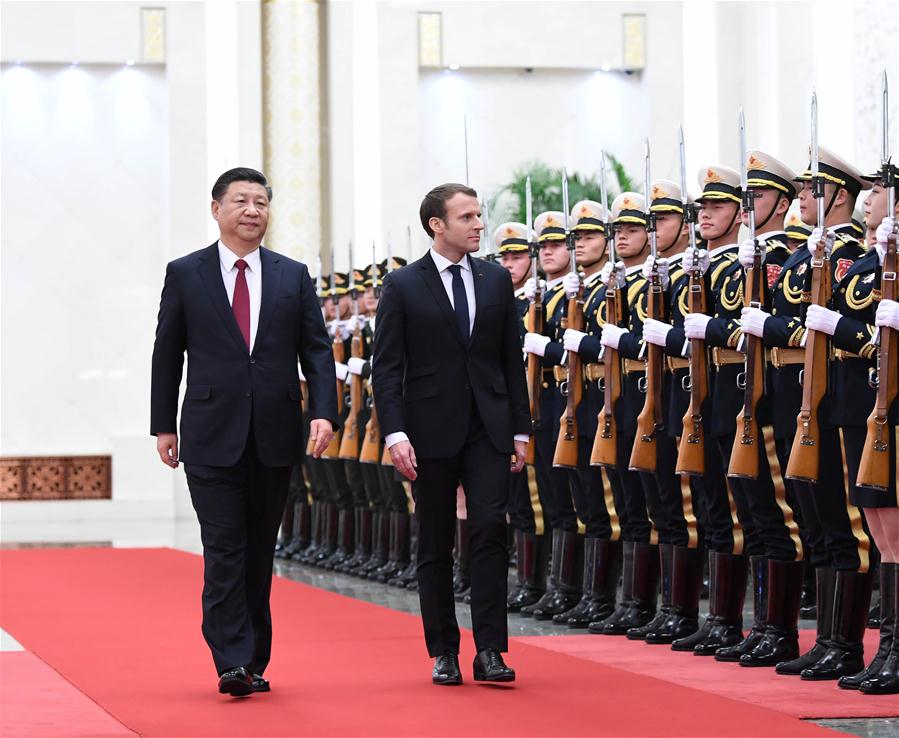
Chinese President Xi Jinping (L) holds a welcome ceremony for visiting French President Emmanuel Macron before their talks in Beijing, capital of China, Jan. 9, 2018. (Xinhua/Zhang Duo)
BEIJING, Jan. 9 (Xinhua) -- China and France Tuesday agreed to further advance their comprehensive strategic partnership.
Chinese President Xi Jinping and French President Emmanuel Macron reached the consensus during their talks in Beijing.
Macron is on a state visit to China from Jan. 8 to 10 at Xi's invitation.
Xi said that Macron is the first foreign head of state to visit China in 2018, as well as the first European leader to visit China since the 19th National Congress of the Communist Party of China (CPC).
"Bilateral ties stand at a new starting point," Xi said. "China stands ready to promote exchanges and enhance mutual trust and cooperation with France in order to inject new impetus into the development of the China-France comprehensive strategic partnership."
Xi stressed that the two countries should give full play to the political leading role of the head of state diplomacy, and promote communication between governments, legislative organs, political parties, and the military of the two countries.
"Both sides should accommodate each other's core interests and major concerns, and properly handle differences in order to make sure the bilateral ties develop steadily on the right track," Xi said.
He called on the two countries to deepen strategic cooperation in traditional areas such as nuclear energy and aerospace, nurture new growth points of cooperation, and promote cooperation in emerging areas including agriculture and food, health and medical services, urban sustainable development, green manufacturing and finance.
Xi called for integrating the development strategies of China and France, strengthening innovative cooperation, and achieving common development in the areas of digital economy, artificial intelligence and advanced manufacturing industry.
"The two countries should seize new opportunities created by the Belt and Road Initiative, and carry out practical cooperation within the Belt and Road framework in order to promote prosperity of Eurasia," he said.
On people-to-people exchanges, Xi called for long-term cooperation and mechanism building in various fields, saying that the two countries should take the Beijing 2022 Winter Olympics and the Paris 2024 Summer Olympics as opportunities to deepen sports cooperation, and enhance tourism and youth exchanges.
"China and France, as permanent members of the United Nations (UN) Security Council and influential major countries, should jointly shoulder their special responsibilities," Xi said.
He called on both sides to safeguard multilateralism, intensify cooperation within the frameworks of the UN and Group of 20, and build a new type of international relations featuring mutual respect, fairness, justice and win-win cooperation.
China and France should join hands to accelerate global governance reform and build an open world economy, fight against all forms of protectionism, and push for an economic globalization that is more open, inclusive, balanced, equitable and beneficial to all, Xi said.
Xi stressed that China and France should combat global challenges together in climate change, terrorism and cyber security for a peaceful and stable world, and build a community with shared future for mankind.
Macron said he is glad to become the first EU country leader to visit China since the 19th National Congress of the CPC, which reflects the importance of the France-China relations.
"We two countries, as permanent members of the UN Security Council, shoulder major responsibilities for global security," he said, adding that France and China had carried out sound cooperation on the stable development of globalization and on coping with climate change.
Macron said France attaches importance to bilateral cooperation within the framework of the Belt and Road Initiative, and he hopes his visit to China could promote exchanges and dialogue in all fields between the two countries.
The French president called on both sides to enhance cooperation on aerospace and nuclear energy, and promote exchanges in education and culture, so as to open a new chapter in bilateral cooperation.
"The EU is currently facing new development, and France stands ready to promote EU-China cooperation," he said.
President Xi reiterated that China, as a firm supporter of European integration, will continue to align its strategy with the European side and deepen mutually beneficial cooperation for further development of China-EU partnerships of peace, growth, reform and civilization.
After the talks, the two heads of state met with entrepreneurs who attended the first meeting of the Chinese-French council of entrepreneurs, and made speeches respectively.
Noting that the Chinese economy is still a major powerhouse and stabilizer of global economic growth, Xi said in his speech that China would continue to implement the concept of innovative, coordinated, green, open, and shared development, stick to the basic state policy of opening-up, and seek high-quality development.
China is ready to work with France and Europe to adhere to two-way opening-up and improve the global economic governance system, Xi said.
The two heads of state also witnessed the signing of documents on bilateral cooperation in areas including nuclear energy, environmental protection, and finance.
The two countries also issued a joint statement Tuesday.
Chinese Premier Li Keqiang and top legislator Zhang Dejiang also met with Macron Tuesday afternoon.
During his meeting with Macron, Li said Sino-French relations have long been at the forefront of relations between China and the West, mainly because both sides have always adhered to mutual respect, equality and win-win cooperation.
"China will continue to deepen reform and opening-up, and further relax market access," Li said.
Li expressed hope that France will further ease its control on the export of high-tech products to China.
Macron told Li that France is ready to enhance cooperation with China in science and technology, artificial intelligence, aviation, nuclear energy and agriculture.



